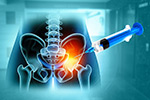Pregnancy is a wonderful and life-changing experience for many, but it also comes with plenty of potential health complications—hypertension, anemia, infections and more. Hip pain is another common issue that occurs during or after pregnancy. Young women are most affected by hip pain during pregnancy or after delivery of their baby or babies.
There are several reasons why some may experience hip pain in pregnancy or hip pain after pregnancy, but luckily there are ways to ease the discomfort that comes with this pain.
Hip Pain During Pregnancy: Causes and How to Treat It
Hip pain in pregnancy is definitely not uncommon. According to one study, 7 out of 10 pregnant women undergo pelvic girdle pain (PGP), a condition that affects the joints in the pelvic area.
A few causes of hip pain include:
- Hormonal changes: A woman’s body undergoes several changes as the body adjusts for the baby growing within. One of these changes is the hormones that are released into the body. These hormones increase this area’s flexibility and make it easier for the woman when delivery time arrives and the baby needs to move within the body. They also cause a woman’s joints and ligaments to loosen by relaxing and softening its connective tissue.
- Changes in Posture: As the baby grows and weight gains, a pregnant woman’s posture is bound to change, contributing to hip pain.
- Pressure on the sciatic nerve: As the uterus becomes larger, pregnant women may begin to experience sciatica caused by pressure on this specific nerve. A pregnant woman may experience symptoms of pain, numbness, or a tingling sensation if the developing baby presses on their sciatic nerve.
- Round ligament pain: Common during the second trimester, this pain can be characterized by a sharp pain in the abdomen or hip area that sometimes extends to the groin area. This pain is caused by a sudden movement that causes the ligament to stretch too quickly. Movement that can cause round ligament pain includes standing, coughing, or even laughing. Pregnancy may be a literal pain, but luckily there are a few ways to treat the various discomforts associated with pregnancy. The following can help alleviate pain in the hip and pelvic region:
- Yoga and other exercises: Strengthening the back and abdominal muscles can help alleviate pregnant women of some of their hip pain. Yoga is one exercise that can help build these muscles. Prenatal yoga is also beneficial and can improve sleep, reduce stress and increase the strength and flexibility of muscles they will need during delivery.
- Warm bath or compress: Applying heat to areas that are sore with a compress can help to alleviate pain. A warm bath is a great way to ease pain in the hip and other areas simultaneously. The warmth will help relax the muscles and reduce joint stiffness.
- Massage: This can also help to release stress around the muscles and joints. If done correctly, by either a partner or massage professional, massaging areas around the hips can help relieve the body’s pain and pressure pregnancy naturally induces.
- Making use of pillows when sleeping: Pillows can help with comfort when sleeping. Pregnant women can ease pressure on their hips and reduce hip pain during sleep by placing a pillow at the small of their back.
- Rest: This can go a long way in alleviating hip pain symptoms. Pregnant women can do this by modifying activities, so they are not on their feet as often and there’s less pressure on their hips and pelvic area.
Hip Pain After Delivering a Baby
Unfortunately, it is also common to experience hip pain after pregnancy. This is natural since delivering a baby is no easy feat. The body has been stretched to accommodate the baby’s arrival and the physical demands of labor, which is why recovery time is usually 6 to 8 weeks following delivery. Sometimes the body and hips experience further damage with labral tears, which affects the hip labrum.
How Long Does Hip Pain Last After Pregnancy?
If you have just given birth, it’s normal to wonder how long does hip pain last after pregnancy? How long hip pain lasts after delivering a baby varies. According to one report, lumbopelvic pain affects about 50% of women, with 37% having symptoms after 3 months. For the other 63%, the symptoms usually subside within 1 to 3 months after delivery.
Hip Pain One Year After Pregnancy
Most individuals' pain should subside by the one-year mark following the delivery of their baby. However, those who continue to have hip pain one year after pregnancy likely have chronic hip pain. This occurs when the joints are inflamed and is likely a result of the natural wear and tear pregnancy and labor puts on a woman’s body.
Luckily, there are plenty of treatments to help ease symptoms of hip pain. These treatments include:
-
Anti-inflammatory medication
-
Physical therapy
-
Cortisone injections
-
Hip replacement surgery
-
Chronic pain rehabilitation centers
Schedule an Appointment Today
Dr. Benjamin Domb offers innovative treatment for patients with hip injuries and is a pioneer in advanced new techniques in hip arthroscopy. Pregnant women and those in the postnatal stages, may experience hip pain. Luckily, hip pain during and after pregnancy can be treated. If you are experiencing hip pain after delivering a baby, there’s relief and treatment available. Simply seek the advice and assistance of a medical professional.
If you would like to receive specialized orthopedic care for your hip condition, schedule an appointment today.





